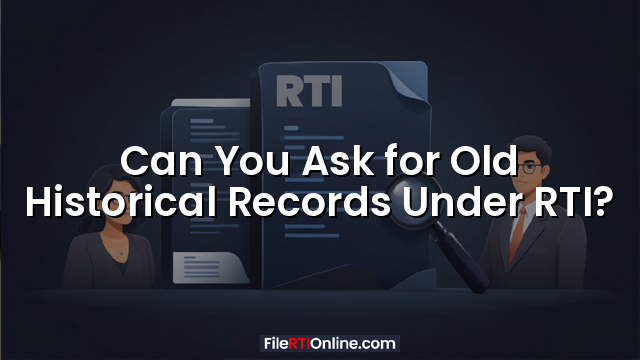Many RTI applicants wonder how far back they can seek information. Can you request records from 20, 30 or even 50 years ago? What if the public authority says the information is “not available” or “too old to trace”?
A key decision of the Central Information Commission (CIC), involving a request for mercy petition records since 1970, provides important clarity on how old information can be demanded and when the PIO must trace and compile such records.
Case Example: Seeking List of Death Convicts Whose Death Penalty Was Commuted
Background
An appellant filed an RTI application with the President’s Secretariat asking for:
· A full list of death-row convicts whose death sentences were commuted to life imprisonment after consideration of their mercy petitions since 1970, and
· Copies of the orders in all such cases.
The application was transferred to the Ministry of Home Affairs (MHA), which stated:
· Records were available only from 1981 onwards,
· Only 11 full case files were traceable,
· Information would be provided on payment of the prescribed fee,
· Free copies can be given only to applicants with a BPL (Below Poverty Line) card.
The appellant, who had been in prison for 17 years, argued that he should receive the information free of cost and insisted on complete details from 1970.
What Happened Before the CIC
During the hearing:
· The appellant agreed to pay the required fees but repeated that he needed all records from 1970.
· The MHA submitted that they only had traceable information from 1981 onwards.
· The PIO claimed that older files (before 1981) were not readily available.
The CIC examined whether the public authority is obligated to trace and compile such old information, especially when the applicant requests it for a public purpose.
Key Findings of the CIC
1. Old records (1970 onwards) should still be traceable
The CIC held that the records related to mercy petitions under Article 72 of the Constitution:
· Are not so old that they cannot be retrieved,
· Concern matters of public importance,
· Should be properly maintained and available for disclosure.
2. PIO must compile and provide complete information
Since the information is of national and public relevance, the Commission directed the MHA to:
· Compile the list of all mercy petition cases since 1970,
· Provide communication of orders in each case,
· Supply the material free of cost to the appellant (considering the circumstances and larger public interest).
3. Larger public interest overrides fee requirements
Although RTI fee exemptions normally apply only to BPL applicants, the CIC used its powers to direct free disclosure because:
· The subject matter involved constitutional powers,
· The information served public interest,
· The applicant was in jail and had no easy access.
What This Case Teaches: How Far Back Can You Ask for RTI Information?
You CAN ask for:
· Information dating back several decades,
· Historical records if they relate to governance, justice, constitutional powers, or public interest,
· Old files that should have been maintained as per record retention rules.
Public Authorities MUST:
· Search for records even if they are old,
· Compile data if the nature of the information requires it and serves public interest,
· Provide copies free of cost if the CIC directs so.
Public Authorities CANNOT:
· Deny information simply “records not readily available”,
· Restrict access only to recent years if older files should exist,
· Avoid compilation when the CIC orders it in larger public interest.
When Can CIC Order Compilation of Information?
Normally, RTI does not require compilation or research.
But the CIC may order compilation when:
· The information relates to constitutional or national importance,
· The records should reasonably exist,
· The subject concerns citizens’ rights,
· There is significant public interest.
In this case, mercy petition decisions under Article 72 fit that criteria.
Conclusion
This case establishes a clear principle:
Citizens can seek even decades-old records under RTI, and public authorities must trace and provide them—especially when the information involves constitutional duties or affects public interest.
The decision reinforces that mere passage of time cannot be an excuse to withhold information under the RTI Act.


